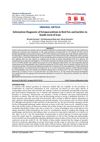 January 2023 in “Zenodo (CERN European Organization for Nuclear Research)”
January 2023 in “Zenodo (CERN European Organization for Nuclear Research)” Olive oil can help regrow hair lost due to COVID-19 or vaccination.
 January 2023 in “Sibirskij medicinskij vestnik”
January 2023 in “Sibirskij medicinskij vestnik” Women with PCOS are more vulnerable to severe COVID-19 and related health issues.
 December 2022 in “Journal of Education, Health and Sport”
December 2022 in “Journal of Education, Health and Sport” Covid-19 can cause different types of hair loss, which can affect people's mental and social well-being.
 June 2022 in “Research, Society and Development”
June 2022 in “Research, Society and Development” COVID-19 may cause increased hair loss, but the exact reason is unclear and standard hair loss treatments are recommended.
 May 2022 in “Authorea (Authorea)”
May 2022 in “Authorea (Authorea)” A 17-year-old girl has had repeated hair loss since childhood, which can be triggered by infections like COVID-19.
 May 2022 in “Acta Scientific Women's Health”
May 2022 in “Acta Scientific Women's Health” A woman lost over 80% of her hair due to a condition called telogen effluvium after having COVID-19.
 April 2022 in “Brazilian Medical Students”
April 2022 in “Brazilian Medical Students” People with androgenetic alopecia may have a higher risk of severe COVID-19.
November 2021 in “Медицинский алфавит” COVID-19 can cause temporary hair loss due to stress and inflammation.
 October 2021 in “Journal of Investigative Dermatology”
October 2021 in “Journal of Investigative Dermatology” The COVID-19 pandemic has led to more severe cases of Leprosy due to delayed medical care.
 June 2021 in “Aesthetic Cosmetology and Medicine”
June 2021 in “Aesthetic Cosmetology and Medicine” Some people lose a lot of hair after having COVID-19.
April 2021 in “Libyan journal of medical sciences” A woman's hair loss improved with treatment after a COVID-19 infection.

The I National Academic Congress of Dermatology in 2021 expanded to include participants from across Brazil and discussed dermatology topics, including COVID-19.
 November 2020 in “Journal of The American Academy of Dermatology”
November 2020 in “Journal of The American Academy of Dermatology” Men with male pattern baldness may be more at risk for severe COVID-19, and anti-androgen treatments could offer protection.
 January 2016 in “Springer eBooks”
January 2016 in “Springer eBooks” A 19-year-old male with delayed puberty was successfully treated for a condition that prevents normal hormone production.

About 19% of foxes and 18% of jackals in southwest Iran have at least one type of ectoparasite, mainly fleas.
March 2023 in “Civil Medical Journal” Androgenetic alopecia in Nepalese men often starts around age 29, with a possible link to COVID-19 worsening the condition.
August 2021 in “Consilium medicum” COVID-19 may worsen hair loss, but treatments like minoxidil can help.
 January 2021 in “International Journal of Dermatology”
January 2021 in “International Journal of Dermatology” Possible link between COVID-19 and hair loss; more research needed.
 188 citations,
May 2009 in “Plant physiology”
188 citations,
May 2009 in “Plant physiology” Researchers found 19 genes important for root hair growth in a plant called Arabidopsis.
 56 citations,
May 2021 in “Journal of infection/The Journal of infection”
56 citations,
May 2021 in “Journal of infection/The Journal of infection” Most hospitalized COVID-19 patients had long-term symptoms like fatigue and hair loss, with women and those sicker during hospitalization at higher risk.
 1 citations,
January 2021 in “Research Square (Research Square)”
1 citations,
January 2021 in “Research Square (Research Square)” Enzalutamide, a prostate cancer drug, may help prevent COVID-19 by blocking the virus from entering lung cells.
 December 2023 in “Tuberkuloz ve Toraks/Tüberküloz ve toraks”
December 2023 in “Tuberkuloz ve Toraks/Tüberküloz ve toraks” Many COVID-19 patients have long-term symptoms, especially women, but certain medications may help reduce these symptoms.
 October 2022 in “Respiratory Medicine”
October 2022 in “Respiratory Medicine” Patients treated in Respiratory Intensive Care Units for COVID-19 are more likely to get mood disorders than those in other care settings.
 January 2022 in “Kampo Medicine”
January 2022 in “Kampo Medicine” Ninjin'yoeito, a Japanese medicine, helped stop hair loss and improved mood in two post-COVID-19 patients.
 January 2021 in “Erciyes medical journal”
January 2021 in “Erciyes medical journal” The COVID-19 pandemic changed the types of skin conditions seen at a clinic, with fewer patients and varying numbers of specific conditions.
 88 citations,
October 2020 in “Open Forum Infectious Diseases”
88 citations,
October 2020 in “Open Forum Infectious Diseases” Some people who recover from COVID-19 continue to have symptoms like fatigue and cough for over 120 days, and some experience hair loss about 59 days after getting sick.
23 citations,
July 2021 in “International journal of laboratory hematology” An 84-year-old man developed severe anemia after his first COVID-19 vaccine shot, improved with treatment, and was advised against a second dose.
 8 citations,
December 2022 in “Nature Reviews Endocrinology”
8 citations,
December 2022 in “Nature Reviews Endocrinology” Sex hormones' effects on COVID-19 are unclear and more research is needed to understand their potential as treatment.
 3 citations,
February 2022 in “Journal of Infection”
3 citations,
February 2022 in “Journal of Infection” People with no symptoms or mild COVID-19 have lower antibody levels, increasing their risk of getting COVID-19 again.
 3 citations,
April 2019 in “Clinical Therapeutics”
3 citations,
April 2019 in “Clinical Therapeutics” Computational tools identified 29 drugs that could potentially target 19 genes involved in chemotherapy-induced hair loss, which could lead to more effective treatments.

























